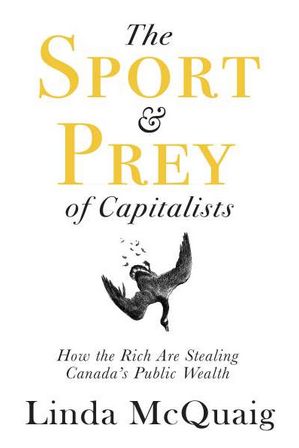The Undervalued Virtues of Public Enterprise

The Sport & Prey of Capitalists: How the Rich are Stealing Canada’s Wealth
Dundurn Press, August, 2019.
By Linda McQuaig
Reviewed by Rick Smith
October 12, 2020
I’m embarrassed to say that I’ve walked by the statue of Sir Adam Beck on University Ave. in downtown Toronto countless times on my way to work, and never even given it a second look. I was finally prompted to do so this week after reading Linda McQuaig’s excellent new book The Sport & Prey of Capitalists: How the Rich are Stealing Canada’s Public Wealth.
On a street full of war monuments, Beck’s impressive statue stands out for its commemoration of a different sort of conflict: the decades-long fight for publicly owned hydro-electricity generation in Ontario. As McQuaig explains in her book, we take for granted that many parts of our lives are enriched by robust public institutions. The vast majority of Canadians are educated in publicly-funded schools. Our illnesses are treated in public hospitals. Our public broadcaster binds our vast country together. And our electricity is generated and distributed by public utilities.
Canadians understand in their bones that public options — like our cherished Medicare system — are more reliable and affordable than usurious private approaches like American health care. But none of this important societal architecture was inevitable. All of it came about only after protracted periods of struggle and inspired political leadership.
The premise of McQuaig’s book is heretical for those of us brought up on rousing stories of iconic Canadian private sector derring-do (think Pierre Berton’s The Last Spike). According to her, we’ve got the country’s history backwards: It’s actually Canada’s unique track record of public sector innovation that distinguishes us in the world.
McQuaig is an entertaining storyteller spinning little-known tales of larger than life characters who led the charge for the critical public institutions that define us as Canadians to this day. Her prose is surprisingly juicy: I mean, how can you not dive into a chapter that begins with “The large hypodermic needle was full of poison”?
The title of McQuaig’s book is taken from a rousing 1905 speech by Conservative Ontario Premier James Whitney. In the early days of the last century, even in the face of a vicious lobby by private sector interests led by Henry Pellatt (whose vast personal fortune built the castle in the middle of Toronto known as Casa Loma), Whitney was convinced to side with his MPP Adam Beck and the growing Public Power movement. In awarding the Niagara Falls generation contract to publicly-owned rather than privately-owned interests, Whitney vowed that hydro-electric power “should not in the future be made the sport and prey of capitalists and shall not be treated as anything else but a valuable asset of the people of Ontario.” You know a cause has unstoppable popular support when even the Conservatives bend to the logic of circumscribing free market excesses.
McQuaig delves into other great — and little known — stories related to how the publicly owned railway CNR out-competed the privately-owned CPR through innovation such as new radio stations, which then led to the founding of the Canadian Broadcasting Corporation. She tells us how the publicly owned Connaught Labs created world-leading, life-saving, vaccines at affordable prices saving countless lives.
These successes — and that is, by any measure, what they are — were wildly popular with Canadians. And McQuaig asks why we don’t aspire to similar useful expansions of the public sector today.
Though McQuaig wrote her book prior to the pandemic, COVID-19 has provided an opportunity to examine her suggestions in a new light. One pressing priority that she mentions, that is now the basis of a growing popular movement, is the need for universal pharmacare. Canada is the only country with a public health care system that does not cover the cost of critical drugs as part of that system. In a recent Broadbent Institute poll, over 90 percent of Canadians said they wanted to fix this problem. This sky-high high level of public support is not surprising when you consider the millions of newly-unemployed or underemployed Canadians who have suddenly lost access to their private, employer-sponsored drug plans. People should not have to go without the drugs that they need in order to afford their monthly rent.
I first met Linda McQuaig in a café in Guelph, Ontario, in 1995 when her earlier book Shooting the Hippo foreshadowed the backlash against the cruelty of government austerity. Since that time, her many books — on economics, energy and social policy — have done more to define the progressive side of the Canadian political debate than any other author.
She’s done it again with this latest offering. In addition to prompting me to give Adam Beck’s statue a second look on my morning commute, McQuaig’s book challenges all of us to view our country — and its promise — in a new way. As we struggle to re-define a fairer, prosperous, post-COVID Canada, this is an enormously valuable contribution.
Rick Smith is an author and Executive Director of the Broadbent Institute.
